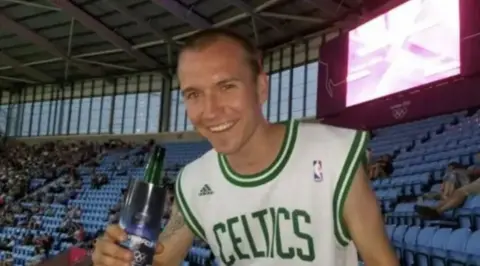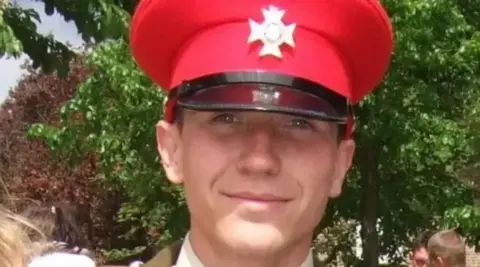Firearms training concerns raised by coroner
 Family photo
Family photoA coroner has raised concerns about the training of firearms officers, following the shooting of an unarmed man by police in Coventry in 2019.
Former soldier Sean Fitzgerald, 31, died during a raid carried out by West Midlands Police and an inquest in May concluded he had been killed lawfully.
But the inquest jury found a number of issues with the planning and execution of the operation and the coroner, Sir John Saunders, published a report on Wednesday aimed at preventing similar deaths in future.
He recommended both the College of Policing and West Midlands Police look again at their training in light of his findings.
West Midlands Police said it would "respond to any concerns identified within the timeline provided".
The raid on the property had followed an investigation into an organised crime gang in the Nuneaton, Bedworth and Coventry areas.
The investigation had been handed over to the West Midlands Regional Organised Crime Unit which received intelligence claiming lead gang members were expected to be at a property in Burnaby Road and got a warrant to search the property.
During the inquest, the officer who shot Mr Fitzgerald said he had seen him emerge from the property carrying what he thought was a gun, but it later turned out to be a mobile phone.
Areas of concern
In his report, the coroner said he had taken into account evidence from the officers involved, senior firearms training officers and other experts on police tactics and on human reactions.
He said he had two main areas of concern - the warnings given and the positioning of armed officers.
The coroner said that in the operation which led to the death of Mr Fitzgerald, there appeared to be a difference of opinion about when officers should shout "armed police" as a warning.
Some believed it should be shouted before entry was made, others believed it should be shouted after entry was made.
In the event, the report states: "The officers at the front of the property did not shout 'armed police' before breaking down the two doors at the front of the property.
"Before any announcement was made, Mr Fitzgerald left through the rear door of the premises and was shot by Officer K, who was providing rear containment."
Sir John said he was concerned the guidance and training given to officers "does not ensure a clear and consistent understanding of when they should announce their presence".
He said the training also did not give a clear enough understanding of the factors to consider in deciding when to make the announcement.
 Family photo
Family photoThe coroner's other main concern was over the guidance officers were given on where they should stand in relation to properties.
In the case of Mr Fitzgerald, the inquest heard the officer who shot him was standing about 7.5ft (2.3m) from the rear door of the property, and fired within just over half a second of the door beginning to open.
The inquest jury found he used "force commensurate with the threat he perceived and acted reasonably in taking up the position which he took, given the briefing he had received".
But the coroner said the experts who gave evidence on human reaction had raised concerns about being in close proximity to a potential source of danger.
They said being too close could significantly elevate an officer's perception of threat, and potentially increased the likelihood that they would respond with force.
The coroner said there was little guidance given to firearms officers on the dangers of being close to entrances.
He said he expected a response from the College of Policing and West Midlands Police by 2 September, setting out the action they intended to take.
In a statement following the publication of the report, West Midlands Police said: "Armed policing is complex and challenging and our firearms officers put themselves in harm's way to protect the public on a daily basis,"
It said those officers "undergo continuous rigorous training to ensure they are suitably equipped for such a vital and demanding role".
The College of Policing said it would carefully consider the coroner's recommendations before responding.
It also said it "regularly reviews and updates guidance and training to ensure this provides practical and supportive advice for forces".
Follow BBC Coventry & Warwickshire on BBC Sounds, Facebook, X and Instagram.
